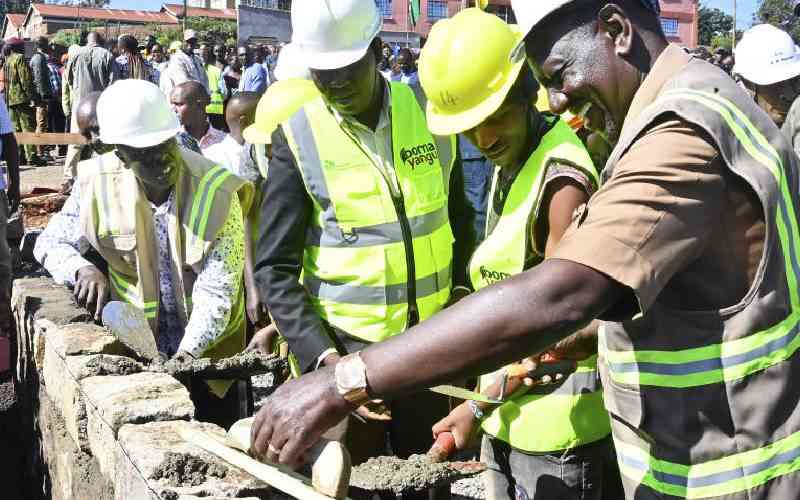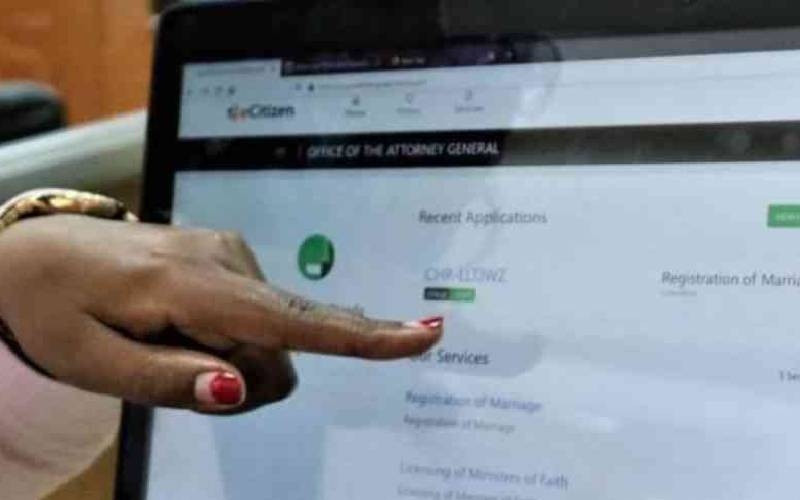By Stephen Makabila
A week after being elected into office in elections supervised by the Government, the new NGO Council National Chairman Wilson Kipsang Kipkazi has sounded a warning to what he terms ‘CSOs undermining the State’.
Kipkazi, in the company of the NGO Council Chief Executive Officer Kevinnah Loyatum, has claimed that about three foreign NGOs were working with some Civil Society Organisations (CSOs) to undermine the Jubilee government.
According to the NGOs Council, there are more than 9,000 NGOs operating in the country, among them 300 foreign ones.
“We know activities of some foreign NGOs and the millions of shillings they have channeled to the grassroots in parts of this country. We are telling them all NGOs must co-operate with the government of the day. The NGO Council will not work in isolation from the government,” said Kipkazi in an interview with The Standard on Sunday before leaving for the African Commission on Human Rights – NGOs Forum in Luanda, Angola.
Loyatum claimed some of the CSOs were attempting to assume roles of the NGOs Council at the grassroots, a move she noted was illegal and punishable under the law.
These claims by the new NGO Council leadership are similar to the ones made by Cabinet Secretary Francis Kimemia in February, when he accused the US development agency (USAid) of funding anti-government protests in Nairobi.
Kimemia had then claimed the National Security Advisory Committee had evidence that USAid had given money to two activists who had organised demonstrations in the city.
But the US ambassador to Kenya Mr Robert Godec dismissed the claims.
While Kipkazi and Loyatum did not name any specific foreign NGOs and the CSOs they were working with, they promised to do so in early May once they are through with piecing together information on the activities of specific organisations under the spotlight.
Kipkazi says the NGO Council will co-operate with the government to weed out suspect NGOs whose activities may endanger national security, a hint that massive de-registration of some NGOs could be on the way.
The new NGO Council chairman further says consultations were on with the Government to have the Public Benefits Act (PBO) commence after some input by stakeholders.
Earlier, some stakeholders in the NGO sector had questioned why the Government had not gazzeted the PBO Act after attempts to introduce amendments.
Intense vetting
“Our worry is why the Ministry of Devolution has not gazetted the original PBO Act after attempts to make amendments failed. The government may be waiting for the elapse of six months to sneak back fresh amendments,” pointed out Ken Wafula, the Executive Director of the Eldoret-based Centre for Human Rights and Democracy.
Stay informed. Subscribe to our newsletter
Wafula also says there is no way the NGO Council can supervise CSOs. “While the NGO Council is anchored in the NGOs Act, CSOs can be companies or trusts. How then does the NGO-council purport to supervise CSOs?” posed Wafula.
On failure by the Government to Gazettee the PBO Act, former Ethics Permanent Secretary John Githongo had also noted sneaking back of amendments was the suspicion on the minds of most people.
The PBO Act 2013 was passed by Parliament in December 2012 and assented to by the now retired President Mwai Kibaki in January 2013.
But Kipkazi downplayed such fears noting, “There should be no fear over the PBO Act, we are in talks with the government and soon the PBO Act will be in operation.”
In the NGOs Council election held in Nakuru last Saturday, 47 interested aspirants were blocked by the Government after an intense vetting process by a committee chaired by an under-secretary in the Ministry of Interior Edison Nyale.
The swearing in of the new NGO-Council leadership by a High Court judge was also swift, being held on Tuesday at Milimani Courts in Nairobi. Before the vetting process, Nyale had told The Standard on Sunday they would be keen on individuals’ integrity, national values and the ability to incorporate Vision 2030 into leadership if elected.
Questionable integrity
Nyale had also said the Government’s involvement was to ensure there was a smooth relationship between the NGO Council and the NGO Coordination board, unlike in the past when the two institutions have been at loggerheads. Kipkazi and Loyatum hailed the vetting, noting it had locked out people whose integrity was questionable.
The elections were officiated by Attorney General’s Representative Roseline Aburuli, who works at the Department of Administrative Justice. Carol Mburugu from Kituo Cha Sheria was the presiding officer.
Kipkazi defeated his lone competitor Lenana Momoi from Kajiado, who got eight votes.
Grace Weru from Central was elected Vice Chairperson after defeating Uba Abdi Ibrahim with her 76 votes against the latter’s 47.
Benjamin Onkoba of North Nyanza was elected unopposed to the post of Council Treasurer.
Executive members elected include Khatra Sigat (North eastern), George Obondo (North Nyanza), Jonathan Kimuge (Central Rift), John Mwangi (Central), Stephen Kemboi (North Rift) and Peter Kubebea (Western). Loyatum said priorities for the new NGO Council team would be capacity building, and re-branding of the council in the next three months.
“We also have our strategic plan in draft, which we are finalising before unveiling. We will map out all NGOs and their thematic roles and facilitate donor linkages for the active ones operating within the law,” added Loyatum.
 The Standard Group Plc is a
multi-media organization with investments in media platforms spanning newspaper
print operations, television, radio broadcasting, digital and online services. The
Standard Group is recognized as a leading multi-media house in Kenya with a key
influence in matters of national and international interest.
The Standard Group Plc is a
multi-media organization with investments in media platforms spanning newspaper
print operations, television, radio broadcasting, digital and online services. The
Standard Group is recognized as a leading multi-media house in Kenya with a key
influence in matters of national and international interest.
 The Standard Group Plc is a
multi-media organization with investments in media platforms spanning newspaper
print operations, television, radio broadcasting, digital and online services. The
Standard Group is recognized as a leading multi-media house in Kenya with a key
influence in matters of national and international interest.
The Standard Group Plc is a
multi-media organization with investments in media platforms spanning newspaper
print operations, television, radio broadcasting, digital and online services. The
Standard Group is recognized as a leading multi-media house in Kenya with a key
influence in matters of national and international interest.









